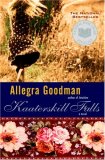Summary | Excerpt | Reading Guide | Reviews | Readalikes | Genres & Themes | Author Bio

The synagogue is crowded with men, and warm despite the November chill outside. When Isaac arrives for services on Friday evening, he sees neighbors and friends all clustered together in the entryway. The Kollel students are coming in from the little chapel where they study. Dressed alike in their rumpled black suits, carrying their great black-bound books, they pass through the crowd into the main sanctuary where the older men are arriving, businessmen coming from downtown, the storekeepers from the neighborhood, the retired grandfathers. Young and old mix together, and their languages mix: English and German, a little Hebrew, a little Yiddish. Isaac does not notice the mixture; he grew up with it, and he understands all the languages equally.
"Did you hear that the Rav is holding his office hours again?"
"No, I didn't know."
"He's holding them on Tuesdays again."
"The same hours?"
"Yes. Of course, he's limiting his visitors, but baruch hashem, he's well enough."
The men speak cheerfully. For of course this is good news. Isaac is annoyed at himself for being troubled by it. He walks into the sanctuary; and, as the service begins, he tries to put the talk out of his mind. He stares intently at the pages in front of him, although he knows the prayers by heart. He closes his eyes as he sings and tries to concentrate on the words. Lechah dodi likras kallah, pinei Shabbas nikabelah. Come, my friend, to meet the bride; let us welcome the Sabbath. And he turns with the other men toward the door of the synagogue. All of them bow to the door expectantly, as if, like a bride in white, the Sabbath were coming to walk down the aisle between them. They sing as if to make it so.
When the short Kabbalat Shabbat service ends, Isaac closes his tiny siddur and puts it into its blue velvet tallis bag. Quickly he walks out into the chilly evening, the air filled with voices, "Good Shabbes, good Shabbes," the streetlights shining brighter than stars, filling the night with their dusty light. The men are walking home to their waiting families. They are hurrying along the tar-black city streets, past fire hydrants and blue mailboxes, telephone booths, shop windows covered with roll-down steel grids. All the Kirshner stores are closed, dimly lit only for security. The butcher, the florist, the bakery, and the specialty groceries, Grimaldi's with its pyramids of fruit, Eisen's Bookshop with its hand-lettered placard, GIANT SEFORIM SALE. They are all closed for Shabbes; the shul closed and locked until morning. But the night is filled with the sounds of the city, the sirens, the thumping beat of music pouring out of cars. The screech of taxis, the rumble of the trains.
Hands in the pockets of his good coat, Isaac walks on. He feels distracted and a little nervous. He knows Elizabeth will want to go to the Rav's office hours, now that they have begun again. She is still thinking about the store. Isaac has not spoken about it to Elizabeth or even told her he called Andras. Still, Elizabeth's idea weighs on his mind, his doubts chafing with his desire to make Elizabeth's store possible. Impractical as it seems, beginning her own project would be such a joy to her. Of course he must tell her that the Rav is holding audiences again. Perhaps he should say that he will go with her to see the Rav. The question tugs at him as he hurries, almost runs, home. Above him the apartment buildings crowd against the sky, not tall and slender like the buildings in midtown, but stocky, shouldering against each other like people in a crowded room.
Isaac lets himself into his building. Loosening his scarf as he goes, he runs up the three flights of stairs to the apartment. Then, at last, he opens the door and steps into the warmth of the living room. It's so warm and bright, the table dazzling white, the toys put away, the candles lit. Every Friday he is amazed at the transformation. The apartment is more than clean; it glows with warmth and safety. In Kaaterskill, Shabbes is somehow not such a surprise. It's beautiful there on all the ordinary days. But in the city, and especially in winter, Isaac is amazed at the way Elizabeth makes their home shine against the black streets. Against the sirens and traffic, the dirty ice outside, the apartment seems to rise like a great yellow moon.
Excerpted from Kaaterskill Falls by Allegra Goodman. Copyright © 1998 by Allegra Goodman. Excerpted by permission of The Dial Press, a division of the Bantam Doubleday Dell Publishing Group, Inc. All rights reserved. No part of this excerpt may be reproduced or reprinted without permission in writing from the publisher.
A few books well chosen, and well made use of, will be more profitable than a great confused Alexandrian library.
Click Here to find out who said this, as well as discovering other famous literary quotes!
Your guide toexceptional books
BookBrowse seeks out and recommends the best in contemporary fiction and nonfiction—books that not only engage and entertain but also deepen our understanding of ourselves and the world around us.